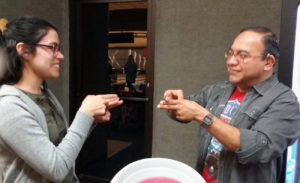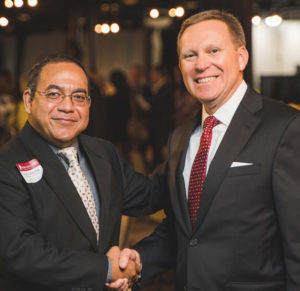Pastor for the Deaf hears God’s call to make disciples
McALLEN—To make disciples for Jesus in the Deaf community, Rogelio Rocha believes a Christian mentor must understand from personal experience the distinctive spiritual challenges non-hearing people face.
He distinguishes between the Deaf—individuals who are born unable to hear and who grow up in that cultural context—and the deaf—people who lose their hearing at some point in life but who grew up hearing.
The Deaf have a distinctive culture, language and worldview, Rocha noted. He wants to bridge the gap between the Deaf community in the lower Rio Grande Valley and the hearing world. Eventually, he wants to disciple pastors from within the Deaf culture.
“I was born hearing and lost my hearing due to a high fever,” he explained. “So, I grew up as hard-of-hearing, meaning I grew up with at least 70 percent hearing in one ear only.”
Although his hearing was impaired, Rocha was able to learn vocal language—both English and Spanish. He also learned to read and write in both languages.
However, about 17 years ago, his life changed when he lost all remaining hearing in his “good ear,” he said.
“I was in college at the time and had to drop out due to severe hearing loss,” he said.
‘God touched my heart’
At that same time, he suddenly felt alienated from the church he attended. He felt as if its members “kind of kicked me out due to not being able to help me,” he said.
“I did my own Bible study at home by myself in my own room,” taking notes as he studied. Rocha worshipped in solitude—“without music, of course,” he added.
“This happened for seven long years until I finally got my first cochlear implant,” he said.
Rocha prayed, asking God to grant him direction for his life.
“God touched my heart and affirmed that I was called to prepare and become a pastor for the Deaf,” he said.
With the blessing of his home church, Iglesia Bautista Emmanuel in McAllen, Rocha wants to plant a church for the Deaf in the lower Rio Grande Valley. Within the next month, he plans to launch a Deaf discipleship class that he hopes eventually will grow to be Emmanuel Deaf Baptist Church.
Different language and learning style
Rocha insists neither offering American Sign Language interpretation in a predominantly hearing congregation nor providing closed captions on a video monitor is adequate to meet all the needs of the Deaf community. Abstract theological concepts do not necessarily translate easily into sign language, and the Deaf have a different learning style than the majority population, he explained.

“Their learning is more visual, creative and practical. They would need to see visual explanations, such as the use of PowerPoint slides or other visual aids, either in the classroom or during a service,” he said.
“Worship is different, as well. They can’t hear music—unless some hard-of-hearing are present. They would want you to crank up the volume as high as it can go. They love it that way. The Deaf can feel its vibrations from the loudness.”
Reaching the Deaf community in a multicultural context like the lower Rio Grande Valley presents its own unique set of challenges, he noted. For example, the Deaf in many parts of Mexico communicate through Mexican Sign Language, which is distinct both from American Sign Language and Spanish Sign Language, with its own grammatical structure and vocabulary.
Still, as a person who can communicate in English, Spanish and American Sign Language—and who has personal experience with hearing loss—Rocha believes God has equipped him to begin a church for the Deaf in McAllen.
“For the glory of God, I can preach in all three languages. I know what it means to be in these three worlds and understand them,” he said. “You know, to be exact, to become a pastor for the Deaf means to become a missionary for the Deaf. A Deaf ministry or Deaf church is, indeed, a mission work.”
Becoming equipped to be an equipper
To prepare for the role of pastor and maker of disciples, Rocha enrolled in Stark College and Seminary, formerly known as the South Texas School of Christian Studies.

“I am in this seminary by the grace and favor of God—very thankful for this great blessing,” he said. “Stark College and Seminary is helping me acquire skills in conducting proper research for teaching and preaching, acquiring deeper knowledge in each of the Old Testament and New Testament books, learning about other cultures and religions, church history, missions and much more.”
Stark College and Seminary purposefully seeks to make theological education accessible, Tony Celelli, president of the school, noted. Recently, the Ygnacio G. Moreno Encouraging and Equipping Endowment was created at Stark College and Seminary to provide scholarships for students with disabilities, he noted.
“Rogelio is the exact kind of student Stark seeks to equip,” Celelli said. “Pursuing higher education comes with all sorts of challenges for Rogelio, but he overcomes those challenges because of God’s call.”
Deaf disciples making more deaf disciples
Currently, Rocha is preparing a manual and a set of PowerPoint presentations for the discipleship classes he wants to start. After leading a group through basic and advanced discipleship courses, he plans to offer a leadership training to enable Deaf disciples to become disciplers. In time, he wants to train and equip indigenous Deaf pastors.
“The Lord wants me to just focus on making disciples for Jesus and train the Deaf to make more disciples,” he said.
“Without disciples, there will be no pastors, and no Deaf pastors means no churches for the Deaf. … It would work best for Deaf to reach other Deaf—that is, Deaf disciples making more Deaf disciples for Jesus.”